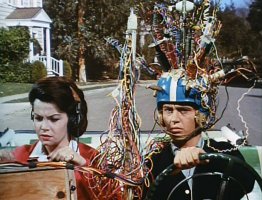A fairly consistent problem for Disney through the decades has been the fact that their audience grows up. While I do believe that a majority of their films are family movies and not children’s movies, I’m also perfectly aware that, when you reach a certain age, your friends tend to look askance at you for still liking even family movies. It’s not universal, but it’s common enough, and the money people at Disney know that as well as anyone. Every now and again, they create a handful of movies intended to overcome that. Some are notably more successful than others.
In 1964, there was Merlin Jones, played by Tommy Kirk. Merlin was a college student, one of your standard nerdy types. This one, however, had a girlfriend, Jennifer, played by Annette Funicello. Merlin is the sort who doesn’t let common sense or anything else stand in his way when it comes to scientific experimentation. He develops a machine to read brain waves, and some kind of malfunction causes him to develop telepathy. He develops a fond relationship with a lab chimp and gets interested in hypnosis. That sort of thing.
The most obvious issue here is that it’s simply not easy to believe that Merlin and Jennifer are anything other than friends. Whether this is because Tommy Kirk is gay or not is impossible, at this junction, to prove, as this is one of the only movies where he’s a romantic figure of any kind. It could be that he’s not that much of an actor; it could be that the pair just didn’t really have chemistry. I know Disney made them go out a few times so it wasn’t as obvious that Kirk was gay, but how successful that was, I can’t say, as I wouldn’t be born for twelve years after this movie came out.
Of course, I don’t have a problem with the idea of Merlin and Jennifer as friends. There is, I grant you, the stereotype of the gay man and his straight female friend, but so what? I’d be up for a newer version of this same story with the two characters anyway; Jennifer is an interesting and well-developed character by the standards we’re working with here, and it wouldn’t be too difficult to make her even more interesting still. She may not be all that interested in science herself, but she’s willing to hang out with her friend in science labs and otherwise get involved in his wacky, well, misadventures.
The New York Times review of the film suggested that the movie played considerably more like two strung-together episodes of a TV show, with each story running approximately half the length of the film. There also seems to be an assumption that no character development is really necessary; certainly none is given. Judge Holmsby (Leon Ames) is introduced with all the characters’ seeming aware of his and Merlin’s history with one another. Rivalries are suggested with characters we’d never met before. Presumably, a Merlin Jones TV show would have continued to have Judge Holmsby being the gentle father figure and Norman (Norman Grabowski) as a continual antagonist.
And honestly, it could be fun as hell. This is not a great movie, and there are some aspects that aren’t as pleasant by 2016 standards—Merlin being asked to kiss a random girl in his class while under hypnosis, for starters, and of course how incredibly white everything is—but still, Merlin’s broad interest in “science!” would be fun to explore. It’s part of why I’d love a more updated take; can you imagine what Merlin Jones would do with computers?
An interesting point about this movie is that its credited screenwriters, “Tom and Helen August,” were in fact the blacklisted couple Helen and Alfred Lewis Levitt. I don’t know if Walt himself knew, but it seems they’d been working for several years under that particular pseudonym. It’s an innocuous enough screenplay, but it seems that’s mostly what they did; their final writing credit—once married, they always worked together—was for an episode of Diff’rent Strokes. The only revolutionary thing either of them seems to have done is The Boy With Green Hair, an odd little anti-war film starring Dean Stockwell in the title role.
There is, that said, a theme in the film that authority isn’t perfect. The last vignette involves Merlin hypnotizing Judge Holmsby to steal Stanley the Chimp from the lab, and there is a discussion about how much any person can be said to have a basically honest nature and how compassion for those who give into their baser instincts is important. Not the sort of thing you necessarily expect from a Disney movie. Sure, Norman is still an obnoxious thug, but the point isn’t that everyone is a decent person, just that even decent people aren’t perfect.
Oh, don’t get me wrong; this is not a deep film. At its heart, it’s still basically just Tommy Kirk messing around with Science! Then again, there’s nothing really wrong with that, and there’s a reason that, when I saw this movie in a bargain bin years ago, I snatched it up. It got played a lot on the Disney Channel when I was a kid, presumably on the grounds that it was inoffensive enough to play a lot, but I think it’s mostly been forgotten since. It deserves better, if not a lot better.

